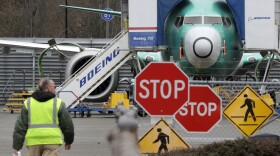
David Schaper
David Schaper is a correspondent on NPR's National Desk, based in Chicago, primarily covering transportation and infrastructure, as well as breaking news in Chicago and the Midwest.
In this role, Schaper covers aviation and airlines, railroads, the trucking and freight industries, highways, transit, and new means of mobility such as ride hailing apps, car sharing, and shared bikes and scooters. In addition, he reports on important transportation safety issues, as well as the politics behind transportation and infrastructure policy and funding.
Since joining NPR in 2002, Schaper has covered some of the nation's most important news stories, including the Sandy Hook school shooting and other mass shootings, Hurricane Katrina and its aftermath, the 2010 earthquake in Haiti, California wildfires, the BP oil spill in the Gulf of Mexico, and numerous other disasters. David has also reported on presidential campaigns in Iowa and elsewhere, on key races for U.S. Senate and House, governorships, and other offices in the Midwest, and he reported on the rise of Barack Obama from relative political obscurity in Chicago to the White House. Along the way, he's brought listeners and online readers many colorful stories about Chicago politics, including the corruption trials and convictions of two former Illinois governors.
But none of that compares to the joy of covering his beloved Chicago Cubs winning the World Series in 2016, and three Stanley Cup Championships for the Chicago Blackhawks in 2010, 2013, and 2015.
Prior to joining NPR, Schaper spent almost a decade working as an award-winning reporter and editor for WBEZ/Chicago Public Media, NPR's Member station in Chicago. For three years he covered education issues, reporting in-depth on the problems and progress — financial, educational and otherwise — in Chicago's public schools.
Schaper also served as WBEZ's Assistant Managing Editor of News, managing the station's daily news coverage and editing the reporting staff while often still reporting himself. He later served as WBEZ's political editor and reporter; he was a frequent fill-in news anchor and talk show host. Additionally, he has been an occasional contributor guest panelist on Chicago public television station WTTW's news program, Chicago Tonight.
Schaper began his journalism career in La Crosse, Wisconsin, as a reporter and anchor at Wisconsin Public Radio's WLSU-FM. He has since worked in both public and commercial radio news, including stints at WBBM NewsRadio in Chicago, WXRT-FM in Chicago, WDCB-FM in suburban Chicago, WUIS-FM in Springfield, Illinois, WMAY-AM in Springfield, Illinois, and WIZM-AM and FM in La Crosse, Wisconsin.
Schaper earned a bachelor's degree in mass communications and history at the University of Wisconsin-La Crosse and a master's degree in public affairs reporting at the University of Illinois-Springfield. He lives in Chicago with his wife, a Chicago Public School teacher, and they have three adult children.
-
Boeing suggests it could fly about mid-2020. Industry sources note that the FAA and other regulators around the world could take months longer to find the planes safe to fly passengers.
-
Boeing's new CEO David Calhoun has served on the company's board of directors since 2009, leading some to worry he can't bring an outsider's perspective and shake things up.
-
Documents released by Boeing related to the design of the 737 Max show disrespect and disdain for the FAA's role in certifying the troubled and now-grounded aircraft.
-
Employees bragged about getting approval for the jets without having to give pilots much new training. One employee says, "This airplane is designed by clowns who ... are supervised by monkeys."
-
Air travel is much safer today because of an increased reliance on automation. But experts say it's harder for pilots to take over when something goes wrong.
-
Production will stop in January. The jets were grounded after two crashes that killed nearly 350 people. Despite being grounded, Boeing continued cranking the planes out at its factory near Seattle.
-
The company said it is waiting for federal regulators to certify fixes for software blamed for two catastrophic plane crashes that killed 346 people.
-
Boeing may stop production of its troubled 737 Max jets now that the FAA has said it may be months before the plane is certified to fly again. That could mean job cuts at Boeing and beyond.
-
A day after hearing criticism from Congress that his agency is too cozy with the manufacturer, the FAA administrator warned Boeing's CEO not to expect quick recertification of the grounded planes.
-
Federal Aviation Administration administrator Stephen Dickson went before Congress on Wednesday to defend his agency's role in the wake of the Boeing 737 Max jet debacle.





